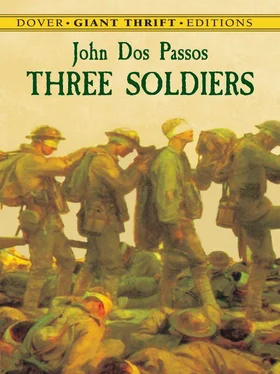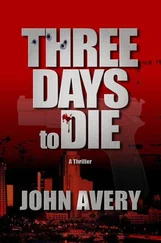“I’ve eaten one. You eat them. You are hungry.”
“Jeanne, I don’t think I have ever been so happy in my life… It’s almost worth having been in the army for the joy your freedom gives you. That frightful life… How is Etienne?”
“He is in Mayene. He’s bored.”
“Jeanne, we must live very much, we who are free to make up for all the people who are still… bored.”
“A lot of good it’ll do them,” she cried laughing.
“It’s funny, Jeanne, I threw myself into the army. I was so sick of being free and not getting anywhere. Now I have learnt that life is to be used, not just held in the hand like a box of bonbons that nobody eats.”
She looked at him blankly.
“I mean, I don’t think I get enough out of life,” he said. “Let’s go.” They got to their feet.
“What do you mean?” she said slowly. “One takes what life gives, that is all, there’s no choice… But look there’s the Malmaison train… We must run.”
Giggling and breathless they climbed on the trailer, squeezing themselves on the back platform where everyone was pushing and exclaiming. The car began to joggle its way through Neuilly. Their bodies were pressed together by the men and women about them. Andrews put his arm firmly round Jeanne’s waist and looked down at her pale cheek that was pressed against his chest. Her little round black straw hat with a bit of a red flower on it was just under his chin.
“I can’t see a thing,” she gasped, still giggling.
“I’ll describe the landscape,” said Andrews. “Why, we are crossing the Seine already.”
“Oh, how pretty it must be!”
An old gentleman with a pointed white beard who stood beside them laughed benevolently.
“But don’t you think the Seine’s pretty?” Jeanne looked up at him impudently.
“Without a doubt, without a doubt… It was the way you said it,” said the old gentleman… “You are going to St. Germain?” he asked Andrews.
“No, to Malmaison.”
“Oh, you should go to St. Germain. M. Reinach’s prehistoric museum is there. It is very beautiful. You should not go home to your country without seeing it.”
“Are there monkeys in it?” asked Jeanne.
“No,” said the old gentleman turning away.
“I adore monkeys,” said Jeanne.
The car was going along a broad empty boulevard with trees and grass plots and rows of low store-houses and little dilapidated rooming houses along either side. Many people had got out and there was plenty of room, but Andrews kept his arm round the girl’s waist. The constant contact with her body made him feel very languid. “How good it smells!” said Jeanne.
“It’s the spring.”
“I want to lie on the grass and eat violets… Oh, how good you were to bring me out like this, Jean. You must know lots of fine ladies you could have brought out, because you are so well educated. How is it you are only an ordinary soldier?”
“Good God! I wouldn’t be an officer.”
“Why? It must be rather nice to be an officer.”
“Does Etienne want to be an officer?”
“But he’s a socialist, that’s different.”
“Well, I suppose I must be a socialist too, but let’s talk of something else.”
Andrews moved over to the other side of the platform. They were passing little villas with gardens on the road where yellow and pale-purple crocuses bloomed. Now and then there was a scent of violets in the moist air. The sun had disappeared under soft purplish-grey clouds. There was occasionally a rainy chill in the wind.
Andrews suddenly thought of Geneviève Rod. Curious how vividly he remembered her face, her wide, open eyes and her way of smiling without moving her firm lips. A feeling of annoyance went through him. How silly of him to go off rudely like that! And he became very anxious to talk to her again; things he wanted to say to her came to his mind.
“Well, are you asleep?” said Jeanne tugging at his arm. “Here we are.”
Andrews flushed furiously.
“Oh, how nice it is here, how nice it is here,!” Jeanne was saying.
“Why, it is eleven o’clock,” said Andrews.
“We must see the palace before lunch,” cried Jeanne, and she started running up a lane of linden trees, where the fat buds were just bursting into little crinkling fans of green. New grass was sprouting in the wet ditches on either side. Andrews ran after her, his feet pounding hard in the moist gravel road. When he caught up to her he threw his arms round her recklessly and kissed her panting mouth. She broke away from him and strode demurely arranging her hat. “Monster,” she said, “I trimmed this hat specially to come out with you and you do your best to wreck it.”
“Poor little hat,” said Andrews, “but it is so beautiful today, and you are very lovely, Jeanne.”
“The great Napoleon must have said that to the Empress Josephine and you know what he did to her,” said Jeanne almost solemnly.
“But she must have been awfully bored with him long before.”
“No,” said Jeanne, “that’s how women are.”
They went through big iron gates into the palace grounds.
Later they sat at a table in the garden of a little restaurant. The sun, very pale, had just showed itself, making the knives and forks and the white wine in their glasses gleam faintly. Lunch had not come yet. They sat looking at each other silently. Andrews felt weary and melancholy. He could think of nothing to say. Jeanne was playing with some tiny white daisies with pink tips to their petals, arranging them in circles and crosses on the table-cloth.
“Aren’t they slow?” said Andrews.
“But it’s nice here, isn’t it?” Jeanne smiled brilliantly. “But how glum he looks now.” She threw some daisies at him. Then, after a pause, she added mockingly. “It’s hunger, my dear. Good Lord, how dependent men are on food!”
Andrews drank down his wine at a gulp. He felt that if he could only make an effort he could lift off the stifling melancholy that was settling down on him like a weight that kept growing heavier.
A man in khaki, with his face and neck scarlet, staggered into the garden dragging beside him a mud-encrusted bicycle. He sank into an iron chair, letting the bicycle fall with a clatter at his feet.
“Hi, hi,” he called in a hoarse voice.
A waiter appeared and contemplated him suspiciously. The man in khaki had hair as red as his face, which was glistening with sweat. His shirt was torn, and he had no coat. His breeches and puttees were invisible for mud.
“Gimme a beer,” croaked the man in khaki. The waiter shrugged his shoulders and walked away.
“Il demand une bière,” said Andrews.
“Mais Monsieur… ”
“I’ll pay. Get it for him.”
The waiter disappeared.
“Thankee, Yank,” roaked the man in khaki.
The waiter brought a tall narrow yellow glass. The man in khaki took it from his hand, drank it down at a draught and handed back the empty glass. Then he spat, wiped his mouth on the back of his hand, got with difficulty to his feet and shambled towards Andrews’s table.
“Oi presoom the loidy and you don’t mind, Yank, if Oi parley wi’ yez a bit. Do yez?”
“No, come along; where did you come from?”
The man in khaki dragged an iron chair behind him to a spot near the table. Before sitting down he bobbed his head in the direction of Jeanne with an air of solemnity tugging at the same time at a lock of his red hair. After some fumbling he got a red-bordered handkerchief out of his pocket and wiped his face with it, leaving a long black smudge of machine oil on his forehead.
“Oi’m a bearer of important secret messages, Yank,” he said, leaning back in the little iron chair. “Oi’m a despatch-rider.”
Читать дальше












